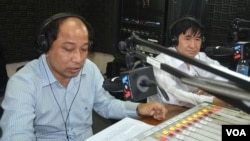Although both the opposition and ruling party have made some steps on election reform, experts say they have much to overcome before they reach full agreement.
The opposition Cambodia National Rescue Party wants a balanced National Election Committee and a revamped voter registry, but the ruling Cambodian People’s Party has a deeply entrenched political system across the country and wields considerable power.
And while civil society can give some recommendations and suggestions, it is largely disenfranchised from the process.
Meanwhile, political issues between the two sides are entangled within technical issues on better running an election, creating further problems, election experts told “Hello VOA” Thursday.
Puthea Hang, head of the election-monitoring group Nicfec, said the circumstances of the July 2013 elections are “still controversial.” There is “no strong leverage in the social sector on politics,” he said, so groups like his must give “technical recommendations.”
Koul Panha, head of the election-monitoring group Comfrel, said political comprise is important, but when the issues are confused between what is politically possible and what must be done at the lower, technical level, it gets complicated.
That’s because there are then two layers of administration, a high political level and a low technical level, he said.
Meanwhile, the two sides are having a hard time selecting a balanced nine-member National Election Committee and its lower, provincial committees, he said.
“One side wants to give power to the NEC chairman to select local NEC officials, and another side wants to have a committee to select them and then bring the issue to the whole NEC to make a decision,” he said.




